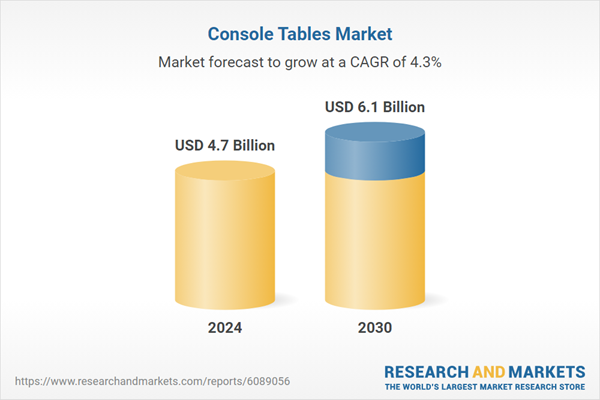Global Console Tables Market - Key Trends & Drivers Summarized
Why Are Console Tables Becoming a Central Element in Modern Interior Design?
Console tables, once considered purely decorative furniture pieces, have evolved into functional design staples across contemporary residential and commercial interiors. Positioned against walls, in entryways, behind sofas, or even in dining rooms and offices, console tables serve both aesthetic and practical purposes - providing surface space, storage options, and architectural balance to interior layouts. Their minimalist footprint and versatile design make them ideal for smaller urban homes and multifunctional spaces, where flexibility and efficient use of space are key. As the global population continues to urbanize and interior spaces shrink, furniture that blends utility with style - like console tables - is gaining popularity. Modern consumers are also placing a premium on cohesive design, which console tables support by offering continuity between rooms, whether through coordinated materials, color palettes, or form factors. Beyond just residential use, console tables are increasingly found in hospitality environments such as hotels, lounges, and restaurants, where they contribute to curated aesthetics while offering convenience for lighting, decor, or reception materials. Their adaptability to different design themes - from industrial and Scandinavian to rustic and luxe - further solidifies their status as a core piece in interior design strategies worldwide.How Are Shifting Consumer Lifestyles and Housing Trends Driving Demand for Console Tables?
Evolving lifestyles, especially among urban dwellers and younger demographics, are significantly shaping demand for console tables. With more people working from home, entertaining in smaller spaces, or living in compact apartments, consumers are seeking furniture that is not only stylish but also space-efficient and multifunctional. Console tables now often double as mini workstations, vanity stations, or storage units, catering to the flexibility modern living demands. In open-plan interiors, they act as subtle spatial dividers without interrupting visual flow, providing structure to otherwise unpartitioned layouts. The popularity of do-it-yourself (DIY) decor and personalization has also influenced consumer preferences, with many opting for console tables that can be easily styled or customized through interchangeable drawers, open shelving, or modular configurations. Moreover, the influence of social media platforms like Pinterest and Instagram, where interior aesthetics are frequently showcased and emulated, has spurred demand for statement furniture pieces like console tables that enhance room ambiance. As home improvement spending continues to rise - fueled by stay-at-home trends and greater consumer focus on wellness and comfort - console tables are increasingly viewed as essential investments in interior design, rather than mere accessories.What Design and Material Innovations Are Transforming the Console Table Market?
The console table market is experiencing a wave of design innovation, driven by advancements in materials, fabrication techniques, and changing design sensibilities. Manufacturers are increasingly experimenting with mixed materials - combining metal frames with marble tops, wood with glass, or concrete with brass accents - to produce eye-catching yet durable pieces. Sustainable materials, including reclaimed wood, bamboo, and recycled metals, are gaining traction as eco-conscious consumers seek environmentally friendly furniture options. Design-wise, console tables are adopting sleeker, more geometric silhouettes aligned with modern and mid-century trends, while ornate, vintage-inspired designs continue to appeal in luxury and heritage-themed interiors. Functional enhancements such as built-in charging ports, hidden drawers, LED lighting, and modular shelving are becoming common, reflecting the consumer desire for furniture that accommodates technology and contemporary lifestyles. Compact, foldable, or wall-mounted designs are also emerging to meet the needs of micro-living and space-saving arrangements. Furthermore, advancements in digital design tools and 3D modeling are allowing designers to bring more complex, customized forms to market quickly, catering to consumers who value uniqueness and personalization. This ongoing innovation is not only expanding the visual and functional appeal of console tables but is also redefining their role as dynamic, adaptive furniture solutions in today's interiors.What Are the Key Drivers Behind the Global Growth of the Console Tables Market?
The growth in the console tables market is driven by several interrelated factors spanning lifestyle shifts, interior design trends, and the increasing role of digital commerce in the furniture industry. One of the primary drivers is the rise in home ownership and renovation activity globally, particularly in emerging markets where middle-class consumers are investing more in aesthetic and functional home furnishings. The growing popularity of compact and modular furniture is further supporting demand, as console tables cater to the need for small-space adaptability without sacrificing style. On the commercial side, increased construction of hospitality venues, corporate offices, and retail spaces is creating new demand for versatile decorative furniture, of which console tables are a key component. E-commerce is also accelerating market expansion by offering consumers a wider selection of styles, materials, and price points with the convenience of home delivery. Additionally, rising consumer awareness of interior design - fueled by online content, influencer marketing, and DIY culture - is pushing furniture brands to innovate rapidly and meet diverse aesthetic preferences. Sustainability trends are another major influence, encouraging the use of eco-friendly materials and ethical production methods. As consumers increasingly seek multifunctional, visually appealing, and responsibly made products, console tables are well-positioned to capitalize on these expectations and maintain strong growth momentum across global markets.Report Scope
The report analyzes the Console Tables market, presented in terms of market value (US$). The analysis covers the key segments and geographic regions outlined below:- Segments: Product Type (Traditional Console Tables, Contemporary Console Tables, Transitional Console Tables, Modern Console Tables, Other Product Types); Material (Wood, Metal, Glass, Other Materials); Distribution Channel (Offline Retail Stores, Specialty Stores, Online Stores, Other Distribution Channels); End-User (Residential, Commercial, Hospitality, Other End-Users).
- Geographic Regions/Countries: World; United States; Canada; Japan; China; Europe (France; Germany; Italy; United Kingdom; Spain; Russia; and Rest of Europe); Asia-Pacific (Australia; India; South Korea; and Rest of Asia-Pacific); Latin America (Argentina; Brazil; Mexico; and Rest of Latin America); Middle East (Iran; Israel; Saudi Arabia; United Arab Emirates; and Rest of Middle East); and Africa.
Key Insights:
- Market Growth: Understand the significant growth trajectory of the Traditional Console Tables segment, which is expected to reach US$2.4 Billion by 2030 with a CAGR of a 5.1%. The Contemporary Console Tables segment is also set to grow at 4.5% CAGR over the analysis period.
- Regional Analysis: Gain insights into the U.S. market, valued at $1.3 Billion in 2024, and China, forecasted to grow at an impressive 7.9% CAGR to reach $1.3 Billion by 2030. Discover growth trends in other key regions, including Japan, Canada, Germany, and the Asia-Pacific.
Why You Should Buy This Report:
- Detailed Market Analysis: Access a thorough analysis of the Global Console Tables Market, covering all major geographic regions and market segments.
- Competitive Insights: Get an overview of the competitive landscape, including the market presence of major players across different geographies.
- Future Trends and Drivers: Understand the key trends and drivers shaping the future of the Global Console Tables Market.
- Actionable Insights: Benefit from actionable insights that can help you identify new revenue opportunities and make strategic business decisions.
Key Questions Answered:
- How is the Global Console Tables Market expected to evolve by 2030?
- What are the main drivers and restraints affecting the market?
- Which market segments will grow the most over the forecast period?
- How will market shares for different regions and segments change by 2030?
- Who are the leading players in the market, and what are their prospects?
Report Features:
- Comprehensive Market Data: Independent analysis of annual sales and market forecasts in US$ Million from 2024 to 2030.
- In-Depth Regional Analysis: Detailed insights into key markets, including the U.S., China, Japan, Canada, Europe, Asia-Pacific, Latin America, Middle East, and Africa.
- Company Profiles: Coverage of players such as API Delevan, Bourns, Inc., Coilcraft, Inc., Delta Electronics, Inc., Eaton Corporation PLC and more.
- Complimentary Updates: Receive free report updates for one year to keep you informed of the latest market developments.
Some of the 42 companies featured in this Console Tables market report include:
- Arteriors Home
- Ashley Furniture Industries, Inc.
- Bernhardt Furniture Company
- B&B Italia S.p.A.
- Cassina S.p.A.
- Crate & Barrel (Euromarket Designs)
- Ethan Allen Global, Inc.
- Global Views
- Godrej & Boyce Mfg. Co. Ltd.
- HNI Corporation
- IKEA
- La-Z-Boy Incorporated
- Lexington Home Brands
- MillerKnoll, Inc.
- Pepperfry Limited
- Pottery Barn (Williams-Sonoma, Inc.)
- Restoration Hardware (RH)
- Studio A Home
- Theodore Alexander
- Wayfair Inc.
This edition integrates the latest global trade and economic shifts into comprehensive market analysis. Key updates include:
- Tariff and Trade Impact: Insights into global tariff negotiations across 180+ countries, with analysis of supply chain turbulence, sourcing disruptions, and geographic realignment. Special focus on 2025 as a pivotal year for trade tensions, including updated perspectives on the Trump-era tariffs.
- Adjusted Forecasts and Analytics: Revised global and regional market forecasts through 2030, incorporating tariff effects, economic uncertainty, and structural changes in globalization. Includes historical analysis from 2015 to 2023.
- Strategic Market Dynamics: Evaluation of revised market prospects, regional outlooks, and key economic indicators such as population and urbanization trends.
- Innovation & Technology Trends: Latest developments in product and process innovation, emerging technologies, and key industry drivers shaping the competitive landscape.
- Competitive Intelligence: Updated global market share estimates for 2025, competitive positioning of major players (Strong/Active/Niche/Trivial), and refined focus on leading global brands and core players.
- Expert Insight & Commentary: Strategic analysis from economists, trade experts, and domain specialists to contextualize market shifts and identify emerging opportunities.
Table of Contents
Companies Mentioned (Partial List)
A selection of companies mentioned in this report includes, but is not limited to:
- Arteriors Home
- Ashley Furniture Industries, Inc.
- Bernhardt Furniture Company
- B&B Italia S.p.A.
- Cassina S.p.A.
- Crate & Barrel (Euromarket Designs)
- Ethan Allen Global, Inc.
- Global Views
- Godrej & Boyce Mfg. Co. Ltd.
- HNI Corporation
- IKEA
- La-Z-Boy Incorporated
- Lexington Home Brands
- MillerKnoll, Inc.
- Pepperfry Limited
- Pottery Barn (Williams-Sonoma, Inc.)
- Restoration Hardware (RH)
- Studio A Home
- Theodore Alexander
- Wayfair Inc.
Table Information
| Report Attribute | Details |
|---|---|
| No. of Pages | 486 |
| Published | February 2026 |
| Forecast Period | 2024 - 2030 |
| Estimated Market Value ( USD | $ 4.7 Billion |
| Forecasted Market Value ( USD | $ 6.1 Billion |
| Compound Annual Growth Rate | 4.3% |
| Regions Covered | Global |









